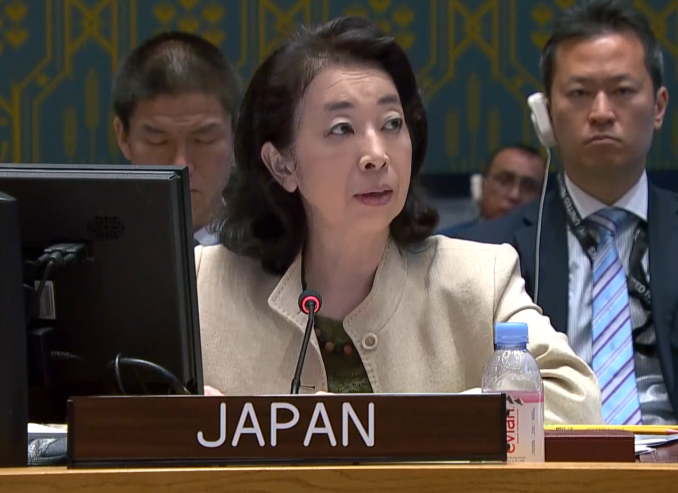Statement by H.E. Ambassador SHINO Mitsuko, Deputy Permanent Representative of Japan to the United Nations, at the United Nations Security Council, Agenda item “The situation in the Middle East (Syria)”
2023/5/30

(As delivered)
Thank you, Madam President, and our thanks go to Special Envoy Geir Pedersen, Ms. Edem Wosornu (OCHA Director of Operations and Advocacy) and Ms. Morgane Aveline (Norwegian Refugee Council) for their interventions.
Regional politics have shifted notably with the Arab League’s decision to reintegrate Syria amid a reduction in tensions in the Middle East. Japan appreciates the efforts by Arab countries to improve the situation in Syria, in particular the Jeddah Arab Summit and the meeting held earlier this month in Amman among the Foreign Ministers of Syria, Jordan, Saudi Arabia, Egypt and Iraq.
In these changing regional dynamics what remains important is that the Syrian Government takes specific actions to improve the humanitarian situation and to implement its obligations under Security Council Resolution 2254. In this regard, Japan will continue to call on the Syrian Government directly to take constructive and tangible actions.
Madam President,
Syrians remain desperately in need of aid. On top of the devastation of war, many are still suffering from the damages caused by the earthquakes earlier this year. Japan recently announced additional assistance worth $14.3 million to build earthquake resilience by conducting damage assessments of buildings and restoring critical infrastructure in Aleppo and Latakia. As a country that has suffered from many earthquakes in the past, Japan truly understands the feelings of the affected Syrian people. Japan is willing to consider additional assistance that reflects the needs on the ground.
It is of paramount importance to ensure smooth humanitarian access to the devastated areas. In this context, we welcome the Syrian Government’s three-month extension of its approval for the two additional crossings of Bab al-Salam and Al Ra’ee for emergency humanitarian assistance, including earthquake relief.
The Security Council resolution on the cross-border aid mechanism should also be extended again in July in order that all aid modalities, including early recovery and crossline assistance, can continue. We, as members of the Security Council, should continue to address the urgent humanitarian needs of the Syrian people.
Madam President,
The Syrian Government should not be granted immunity from what it has done to its own people, even under the new regional dynamics. This is particularly true on the issue of missing persons, as the fates of more than 100,000 people remain unknown.
With this in mind, Japan has heard the calls, including from the Secretary-General and Special Envoy, to establish an independent institution to determine the fate of the missing. We support the objectives of such an institution and we are ready to engage constructively to ensure that it will be accountable and effective.
I thank you, Madam President.
Regional politics have shifted notably with the Arab League’s decision to reintegrate Syria amid a reduction in tensions in the Middle East. Japan appreciates the efforts by Arab countries to improve the situation in Syria, in particular the Jeddah Arab Summit and the meeting held earlier this month in Amman among the Foreign Ministers of Syria, Jordan, Saudi Arabia, Egypt and Iraq.
In these changing regional dynamics what remains important is that the Syrian Government takes specific actions to improve the humanitarian situation and to implement its obligations under Security Council Resolution 2254. In this regard, Japan will continue to call on the Syrian Government directly to take constructive and tangible actions.
Madam President,
Syrians remain desperately in need of aid. On top of the devastation of war, many are still suffering from the damages caused by the earthquakes earlier this year. Japan recently announced additional assistance worth $14.3 million to build earthquake resilience by conducting damage assessments of buildings and restoring critical infrastructure in Aleppo and Latakia. As a country that has suffered from many earthquakes in the past, Japan truly understands the feelings of the affected Syrian people. Japan is willing to consider additional assistance that reflects the needs on the ground.
It is of paramount importance to ensure smooth humanitarian access to the devastated areas. In this context, we welcome the Syrian Government’s three-month extension of its approval for the two additional crossings of Bab al-Salam and Al Ra’ee for emergency humanitarian assistance, including earthquake relief.
The Security Council resolution on the cross-border aid mechanism should also be extended again in July in order that all aid modalities, including early recovery and crossline assistance, can continue. We, as members of the Security Council, should continue to address the urgent humanitarian needs of the Syrian people.
Madam President,
The Syrian Government should not be granted immunity from what it has done to its own people, even under the new regional dynamics. This is particularly true on the issue of missing persons, as the fates of more than 100,000 people remain unknown.
With this in mind, Japan has heard the calls, including from the Secretary-General and Special Envoy, to establish an independent institution to determine the fate of the missing. We support the objectives of such an institution and we are ready to engage constructively to ensure that it will be accountable and effective.
I thank you, Madam President.
